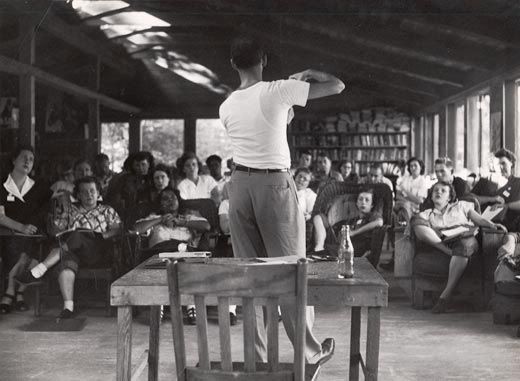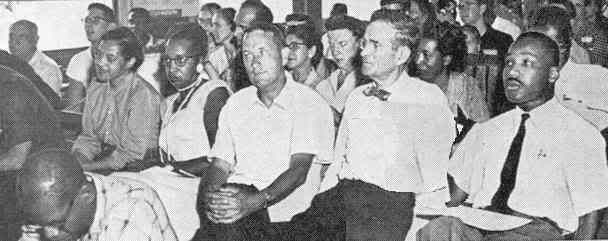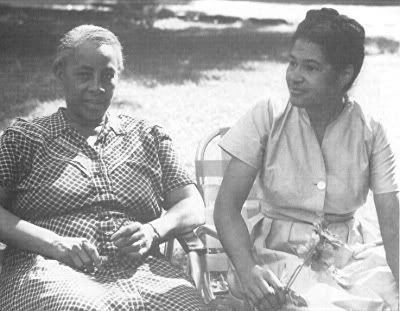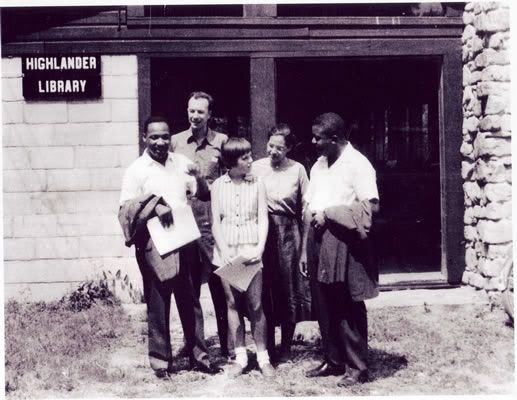Pete Seeger and Majora Carter
Carl Pope and Van Jones
Bonnie Raitt and Dolores Huerta
Anthony Romero and Ava Lowrey
Tom Hayden and Naomi Klein
I recommend them all to you for a shot of both history and inspiration. But I was particularly struck by a couple of things Seeger said that are captured in this short clip.
First of all, he said this about Martin Luther King, Jr. and the Montgomery Bus Boycott.
Why did he start with a bus boycott? Why didn't he start with something like schools, or jobs, or voting? Couldn't a bus boycott come later?
When you face an opponent over a broad front, you don't aim at the opponent's strong points. You aim for something a little off to the side. But you win it. And having won that bus boycott...13 months it took him to do it...then he moved on to other things.
This struck me as incredibly powerful when I first heard it. I began to imagine the kinds of things facing African Americans in 1955 in the South. It wasn't just segregation - it was the almost complete denial of voting rights, it was lynchings and bombings, etc. At what point does where someone sits on a bus become the priority place to begin?
As Pete Seeger said...it began at the place where the movement could likely win...and use that to build upon for the rest of the work.
Then he goes on to tell the story of how he met MLK and Rosa Parks. It was at the Highlander Folk School (today, the Highlander Research and Education Center).
In 1932, Miles Horton, Don West, Jim Dombrowski and others founded the Highlander Folk School as a place to train union members, labor leaders, and the unemployed in Tennessee. In the 1950's that mission extended to training organizers in the Civil Rights Movement. As Seeger discusses in the video - people like Martin Luther King and Rosa Parks participated in these sessions.


Rosa Parks on the far left and Martin Luther King on the far right.

Septima Clark and Rosa Parks

Martin Luther King, Pete Seeger, Horton's daughter, Rosa Parks, and Ralph Abernathy
I just love the story Seeger tells about being in a group with Rosa Parks at the end of one of these sessions and all of them being asked what they were going to do when they went home. Rosa said she didn't know, but she'd come up with something. Boy did she!!!!!
This is how and where the Civil Rights Movement started...with a few people dedicated to learning, thinking, strategizing and then finally launching it with a battle they could win.
It would be 9 years before the Civil Rights Act was passed. And that was yet another beginning...the struggle continues today.
Its no surprise to me that in our fast food, 24 hour/day news culture, we hear whining about the slow pace of change. So lets continue to remind ourselves of our history and what these wise people have to teach us.




Hi Smartypants
ReplyDeleteThis post is fantastic!! I have tweeted it and hope it get retweeted a lot. You do really great work. Thanks
Smilingl8dy
Thanks so much Smilingl8dy. I appreciate your support a LOT!
ReplyDeleteWhat a wonderful blog post, thanks so much, patience is a virtue we often misplace.
ReplyDeleteThanks WiW!
ReplyDeleteI just had a funny thought:
I don't suppose that these folks at the Highlander School wasted their time talking about "what to do when the President isn't just that into you."
LOL